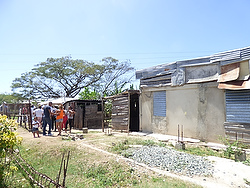By Rhina Guidos (Third in a Series)

BAY OF NIPE, Cuba (CNS) – In the yard of a rural home in the Cuban countryside, a group of 25-30 Catholics gather each week to pray, sometimes to break bread together, but mostly to form a Catholic community where a formal parish does not exist. They meet under a tin roof held together by long pieces of metal from what used to be train tracks.
It’s called a “casa de mision” or mission house, and out of such small structures Cuba’s practicing Catholics have been gathering since the 1990s for catechism classes, to share the Gospel, to pray together, to plan pastoral ministries – any activity normally found in a parish, says the document “Small Communities: a Dawn of a New Way of Being Church,” published by the Cuban bishops’ conference.
Ever since the state began curtailing religious freedom in Cuba following the establishment of a communist regime in 1959, church property was seized. Parishes where the people met were put to nonreligious uses; priests and religious were exiled, and the few who remained had a hard time gathering the flock without problems from the government.
However, lay Catholics could always find a private home or another space to come together as a community – even if quietly.
“In a society in which clerics were scarce, the laity became the protagonists,” said Father Estefan Turcios Carpano, national director of the Pontifical Mission Societies in El Salvador, who visited Cuba in March and met with various small communities in mission houses.
Church leaders say the communities that have operated out of these mission houses have been crucial to the survival of the Catholicism in Cuba, and they proudly call them the “new face of the Cuban parish.”
Even though the 1998 visit by St. John Paul II alleviated the persecution of Catholics on the island, many church buildings have fallen into disrepair, or the state is still using them. Up until last year, no new construction of Catholic churches had been permitted since 1962, according to the small communities document.
Even today, some old churches are battered and do not have pews and other necessities to run a parish out of them. But Cuban Catholics have gotten creative, Father Turcios said.
At the mission house without walls near the Bay of Nipe, 59-year-old Leonides Rodriguez meets weekly with fellow Catholics, like 35-year-old Yorlandy Perdomo. They read the Gospel, pray and participate in Mass when a priest is available.
Perdomo partly credits the work of the mission house for his conversion. Like many Cubans of his generation, he grew up without a religion and often publicly poked fun at believers, he said.
But as he passed through town one hot day, he was thirsty and asked for water at the mission house. He started talking to the people who were there, and he said he’s not sure what happened other than “I met the Lord.” He started visiting the house regularly and became a Catholic.
With Rodriguez, he now organizes a program to provide basics, such as rice and beans or medicine to those in need in their midst – whether or not they believe in a higher power.
Near Santiago de Cuba, in a Soviet-era apartment complex, a small community of Catholics began gathering regularly in a one-bedroom apartment to hear the Gospel. Today, the apartment, with a regular group of 50, is officially a parish.
A large crucifix rests against a wall; the ambo is pulled out of a closet and people crowd in on small bench-like chairs when the priest arrives to celebrate Mass. There’s talk of having the priest move into another one-bedroom apartment in the building and run the parish out of the living room.
Though unusual, this is the reality of the lives of faith of some Catholic Cubans. The number is unknown, but many do not have a concept of a parish in the traditional sense. In a way, this has increased their missionary spirit, because they take the Gospel with them wherever they go, Father Turcios said, and there’s beauty in it because “the parish is not something limited to a building.”
From these small spaces, Catholics on the island have organized prison ministries, visits to children with disabilities in their localities and comforted one another when times were rough.
